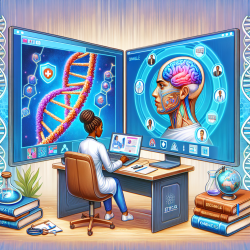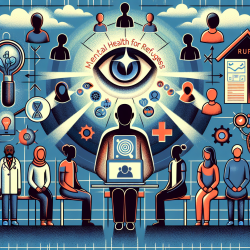Introduction
As we advance into the genomic era, the intersection of genomics and therapy presents an exciting frontier for speech-language pathologists and online therapy providers like TinyEYE. The research article "New Technologies: Ethics of Genomics" by Capps and Quah offers a comprehensive exploration of how genomics can transform public health and therapy practices. This blog aims to elucidate the potential applications of genomic insights in online therapy, encouraging practitioners to enhance their skills and outcomes by integrating these cutting-edge developments.
Understanding Genomics in Therapy
Genomics, the study of genomes, provides insights into the genetic underpinnings of various conditions. By understanding the genetic variations that contribute to speech and language disorders, therapists can tailor interventions to the unique genetic profiles of their clients. This personalized approach can significantly improve therapy outcomes, making interventions more effective and efficient.
Data-Driven Decisions in Online Therapy
Incorporating genomic data into therapy practices aligns with the data-driven decision-making model that is crucial for achieving optimal outcomes. By leveraging genomic information, therapists can identify specific genetic markers associated with speech and language disorders. This allows for the development of targeted interventions that address the root causes of these disorders, rather than just the symptoms.
Ethical Considerations
The integration of genomics into therapy practices raises important ethical considerations. Issues such as consent, privacy, and the potential for genetic discrimination must be carefully navigated. Practitioners must ensure that they are fully informed about the ethical implications of using genomic data and that they adhere to best practices in data management and client confidentiality.
Encouraging Further Research
The potential applications of genomics in therapy are vast, but further research is needed to fully realize its benefits. Practitioners are encouraged to stay informed about the latest developments in genomic research and to participate in studies that explore the efficacy of genomic-informed interventions. By contributing to the growing body of knowledge in this field, therapists can help shape the future of therapy practices.
Conclusion
The integration of genomics into online therapy practices offers a promising avenue for improving therapy outcomes. By embracing data-driven decisions and considering the ethical implications, practitioners can harness the power of genomics to provide more personalized and effective interventions. As we continue to explore the potential of genomics, the future of therapy looks brighter than ever.
To read the original research paper, please follow this link: New Technologies: Ethics of Genomics










